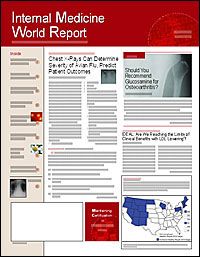Get Your Patients to Exercise-and Live Longer, Healthier Lives
Adults aged >=50 years who engage in physical activity on a regular basis can extend their lives by up to almost 4 years and give them more than 3 extra years without cardiovascular disease (CVD), according to a new analysis of data from the Framingham Heart Study.
Investigators developed multistate life tables that allowed them to measure the effects of low-, moderate-, and high-intensity exercise, based on weighted scores for daily activities (ranging from 1 for sleeping to 5 for heavy activity). The results were published in the Archives of Internal Medicine (2005;165:2355-2360).
After adjusting for age, sex, and other variables (ie, smoking, cancer, left ventricular hypertrophy, diabetes, arthritis, ankle edema, and pulmonary disease), the findings showed that the higher the level of physical activity, the longer the life expectancy and the longer the period one can expect to be free of CVD (Table 1).
A second study appearing in the same issue (pages 2362-2369) offers guidance to physicians on helping their sedentary older patients increase their level of activity, including a prescription for walking 30 minutes per day at moderate intensity (ie, 45%-60% of heart rate reserve) for 5 to 7 days per week (high frequency) or at hard intensity (65%-75% of heart rate reserve) for 3 to 4 days per week (low frequency).
A total of 492 sedentary adults (64% women) were randomly assigned to 1 of 4 exercise intensity/frequency prescription groups and given heart rate monitors to wear while exercising, along with a log for recording their heart rate.
The fifth "control group" received physician advice consisting of a 90-minute group session in which a physician talked about the benefits and risks of physical activity, gave detailed recommendations, described how to measure their heart rate, and advised them to participate in 30 minutes per day of moderate-intensity exercise on at least 5 days weekly.
"Exercise counseling with a prescription for walking (30 min/d) at either a [moderate intensity/high frequency] or [high intensity/moderate frequency] produced significant improvements in cardiorespiratory fitness that were observed at 6 months and maintained over 24 months," the authors wrote (Table 2).
Another notable finding is that "there was no significant difference for adherence between the low- and high-frequency groups, suggesting that recommending 5 to 7 days per week of exercise is not a deterrent," observed the authors of an accompanying editorial (pp 2324-2325).
